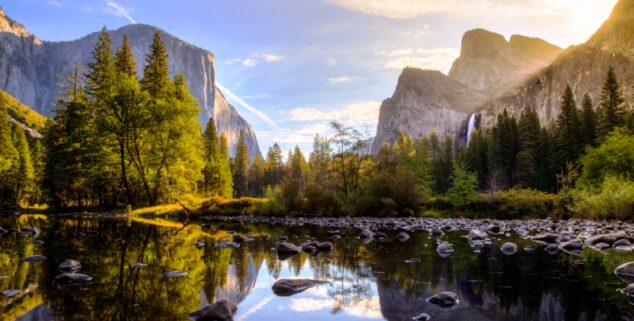Opinion
Preserving, protecting public lands is a top priority
 Sunrise at Yosemite National Park. (Photo: Stephen Moehle, via Shutterstock)
Sunrise at Yosemite National Park. (Photo: Stephen Moehle, via Shutterstock)From my home in Ventura County, I can see the rugged hills and green oak trees of the Los Padres National Forest. I grew up in this area and have spent countless days exploring my wild backyard. As a kid, these lands were a constant in my life and I thought they would always remain unchanged. But as an adult, I know these places are threatened by development and climate change.
We cannot take our public lands for granted and we must advocate for their protection.
Before 2022 comes to a close, the president and Congress have a unique opportunity to conserve public lands and rivers in California. Our leaders can accomplish this by prioritizing federal legislation called the Protecting Unique and Beautiful Lands by Investing in California (PUBLIC) Lands Act as well as moving forward an effort to expand Berryessa Snow Mountain National Monument.
Together, these two efforts represent an opportunity to invest in our state’s economy and the health of Californians and to address the effects of climate change.
The PUBLIC Lands Act is championed by U.S. Sen. Alex Padilla and Reps. Carbajal, Chu and Huffman. The bill would protect over 500 miles of rivers and more than one million acres of public lands, including in Northwest California, the Los Angeles region, and the Central Coast. It would help conserve wildlife habitat and drinking water sources as well as places that Californians love to visit. I am grateful to Senator Padilla for championing this legislation and I urge Congress to pass the PUBLIC Lands Act before the end of this year.
Also underway is an effort to add adjacent public lands known as Molok Luyuk (Condor Ridge) to Berryessa Snow Mountain National Monument in Northern California. Reps. Garamendi and Thompson and Sens. Padilla and Dianne Feinstein are championing this cause and, alongside the Yocha Dehe Wintun Nation, recently called on President Biden to use the Antiquities Act to expand the monument. Doing so would help protect public lands that are culturally significant, increase access to the outdoors, and help preserve this important wildlife habitat. I hope to see the President and Congress move forward with this monument expansion before the end of the year.
Together, these two efforts represent an opportunity to invest in our state’s economy and the health of Californians and to address the effects of climate change.
It is well documented that spending time in nature benefits our physical and mental health.
The outdoors is economically critical to our state. When people explore our public lands, they also contribute to the economy, whether by supporting nearby businesses or shopping for gear. My colleagues and I at Peak Design see this firsthand as a company that creates travel and photography equipment. The preservation of our public lands is essential to our bottom line and we are not alone. In 2021, California’s outdoor recreation economy supported over 517,000 jobs. Protecting our public lands is an investment in this economic engine that helps drive California’s economy.
Conserving our public lands is also important for the health of Californians. It is well documented that spending time in nature benefits our physical and mental health. But not everyone has access to public lands close to where they live.
In fact, research highlights that Latinos and other people of color are two times more likely to be deprived of nearby nature than white Californians. The PUBLIC Lands Act will help address this inequity by expanding protections for public lands near communities that have limited access to parks and the outdoors.
We also know that protecting our public lands and rivers is one of the most effective ways to address the impacts of climate change. Expanding the monument and passing the PUBLIC Lands Act will safeguard habitat areas and wildlife corridors that are key for the survival of species in the face of warming temperatures. And both efforts will contribute to state and federal commitments to protect 30% of our public lands and waters by 2030.
I hope that President Biden and Congress will move forward with both these efforts. This is an opportunity to conserve special places for generations to come and I urge our leaders in Washington to act.
—
Editor’s Note: Annie Nyborg is the Sustainability Director at Peak Design.
Want to see more stories like this? Sign up for The Roundup, the free daily newsletter about California politics from the editors of Capitol Weekly. Stay up to date on the news you need to know.
Sign up below, then look for a confirmation email in your inbox.

Leave a Reply